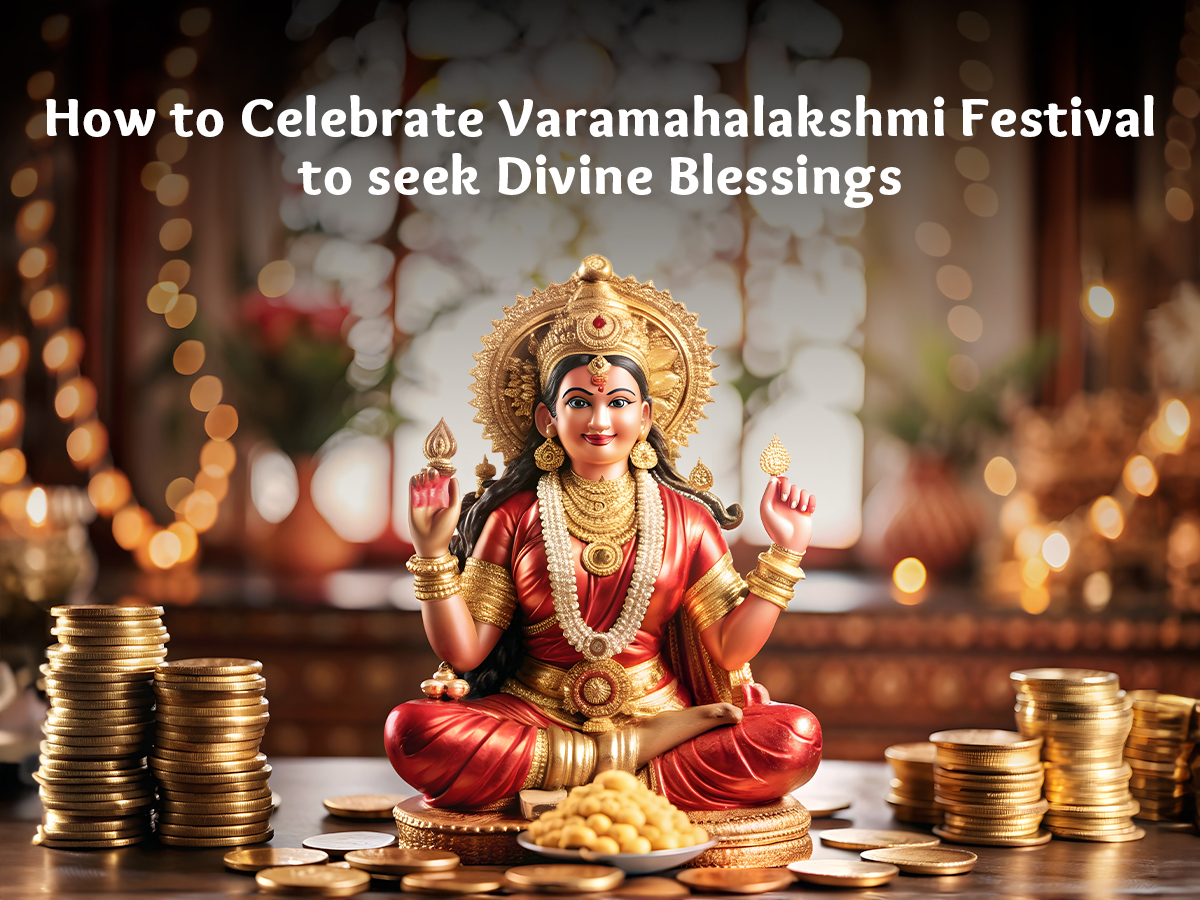How to Celebrate Varamahalakshmi Festival to seek Blessings

Introduction
Varamahalakshmi Vrat is a significant Hindu festival, especially in South India, dedicated to Goddess Lakshmi, the deity of wealth, prosperity, and abundance. Primarily observed by married women, the festival is a time to seek blessings for their families' well-being and financial stability.
The Varamahalakshmi festival is steeped in tradition and devotion. It is not only a day of worship but a celebration of artistic expressions such as rangoli, kolams, and intricate decorations, all aimed at welcoming the goddess into their homes. As families gather to celebrate, the festival becomes a time of bonding, reflection, and gratitude. The connection to the divine is celebrated through rituals, prayers, and the preparation of special sweets and meals.
When is Varamahalakshmi Puja 2024 celebrated?
Varamahalakshmi Puja in 2024 is celebrated on August 16, 2024. This festival is dedicated to Goddess Varamahalakshmi and is observed on Friday. It's a significant day for devotees praying for prosperity and well-being.
Why do we celebrate the Varamahalakshmi Festival?
The significance of the Varamahalakshmi Puja lies in its association with wealth and prosperity. Women observe this fast to enhance their family’s financial status, seeking blessings from Goddess Lakshmi for material abundance, happiness, and well-being. The festival not only honors the goddess but also fosters a sense of community, as families and neighbors often come together to share the joy of the celebration.
The festival is also associated with the celebration of the eight forms of Goddess Lakshmi, known as the Ashta Lakshmis, each representing a different aspect of wealth and prosperity. By honoring these divine forms, devotees seek to attain not just material wealth, but also spiritual growth and harmony within their families.
Varamahalakshmi Festival is a time of joy, devotion, and gratitude. It reinforces the values of sharing, kindness, and the importance of family, providing a cherished occasion for loved ones to gather and celebrate their shared blessings. It serves as a reminder for devotees to uphold dharma (righteousness) and engage in charitable acts.
Story of Varamahalakshmi
The story behind the Varamahalakshmi Vrat traces back to ancient Hindu mythology. According to the legend, once the celestial beings were faced with a dire situation due to lack of riches and resources. They sought the assistance of Goddess Lakshmi, who embodies wealth and prosperity.
To obtain her blessings, the gods organized a grand ceremony and invited the goddess to preside over the event. They prayed fervently, and the goddess, pleased with their devotion, granted them her blessings, thereby restoring prosperity across the realms. This divine act led to the establishment of the Varamahalakshmi Vrat, where the faithful commemorate this occasion through rituals and prayers.
How to Perform Varamahalakshmi Puja/Vrat
Those who wish to observe the Varamahalakshmi Vrat should be prepared to dedicate the day to rituals of devotion. Here’s a simple puja guide on how to perform the puja
Preparation
Begin by cleaning your home and your puja area. Arrange the necessary items for the puja, including an idol or picture of Goddess Lakshmi, flowers, fruits, sweets, and akalash (pot filled with water).
Sankalp (Intention)
As you start your day, take a vow to maintain the fast, abstaining from food until you complete the puja.
Alankaram (Decoration)
Decorate the puja area with flowers and rangoli designs. Place the idol or picture of the goddess on a decorated platform.
Puja Vidhi (Rituals)
- Aavahanam (Inviting the Goddess): Invoke Goddess Lakshmi by chanting her name and inviting her into your home.
- Naivedyam (Offering Food): Prepare and offer a variety of food items, especially sweet dishes like kesari, payasam, and laddu.
- Aarti: Perform aarti while singing devotional songs in praise of the goddess. Light diyas and burn incense sticks.
- Pradakshina (Circumambulation): Circumambulate the deity while chanting mantras dedicated to Lakshmi.
Akshata (Rice)
After finishing the puja, sprinkle rice over the offerings as a symbol of prosperity.
Closing Prayers
Conclude the puja with prayers seeking blessings for your family, financial stability, and overall well-being.
Distribution
Share the prasad (offered food) with family and friends, spreading joy and abundance.
How Different Regions Celebrate Varamahalakshmi Festival in India
In India, the celebration of Varamahalakshmi Vrat has flavors unique to various regions
Karnataka: In Karnataka, the festival is celebrated with great fervor; women dress in colorful sarees, apply intricate kolams at their doorsteps, and offer a lavish spread of dishes to the goddess. The puja often involves community gatherings, where neighbors come together to celebrate.
Andhra Pradesh & Telangana: Here, the Varamahalakshmi festival coincides with other local traditions, and it is marked by special poojas at temples. Families actively participate in the preparations, cooking special dishes to offer to Goddess Lakshmi.
Tamil Nadu: In Tamil Nadu, women set up elaborate displays of food offerings, including traditional sweets. They follow the ritualistic customs closely, often engaging in community pujas in local temples, enhancing the feeling of togetherness.
Maharashtra: Though not as widely celebrated as in South India, some Maharashtrian households honor Lakshmi on this day, particularly with the preparation of special dishes like modak and puran poli, which are offered during the puja.
Conclusion
The Varamahalakshmi Vrat is more than just a day of worship; it embodies the devotion of countless women who seek the blessings of the goddess for their families. It showcases the perfect blend of tradition, spirituality, and community spirit. As we prepare for this auspicious occasion in 2024, let us remember the true essence of the festival—gratitude, joy, and the celebration of womanhood. May Goddess Lakshmi shower all with her eternal blessings and grace.










